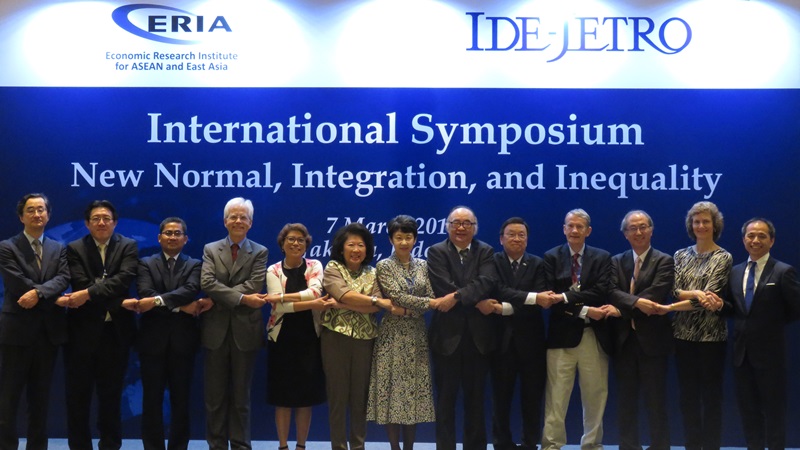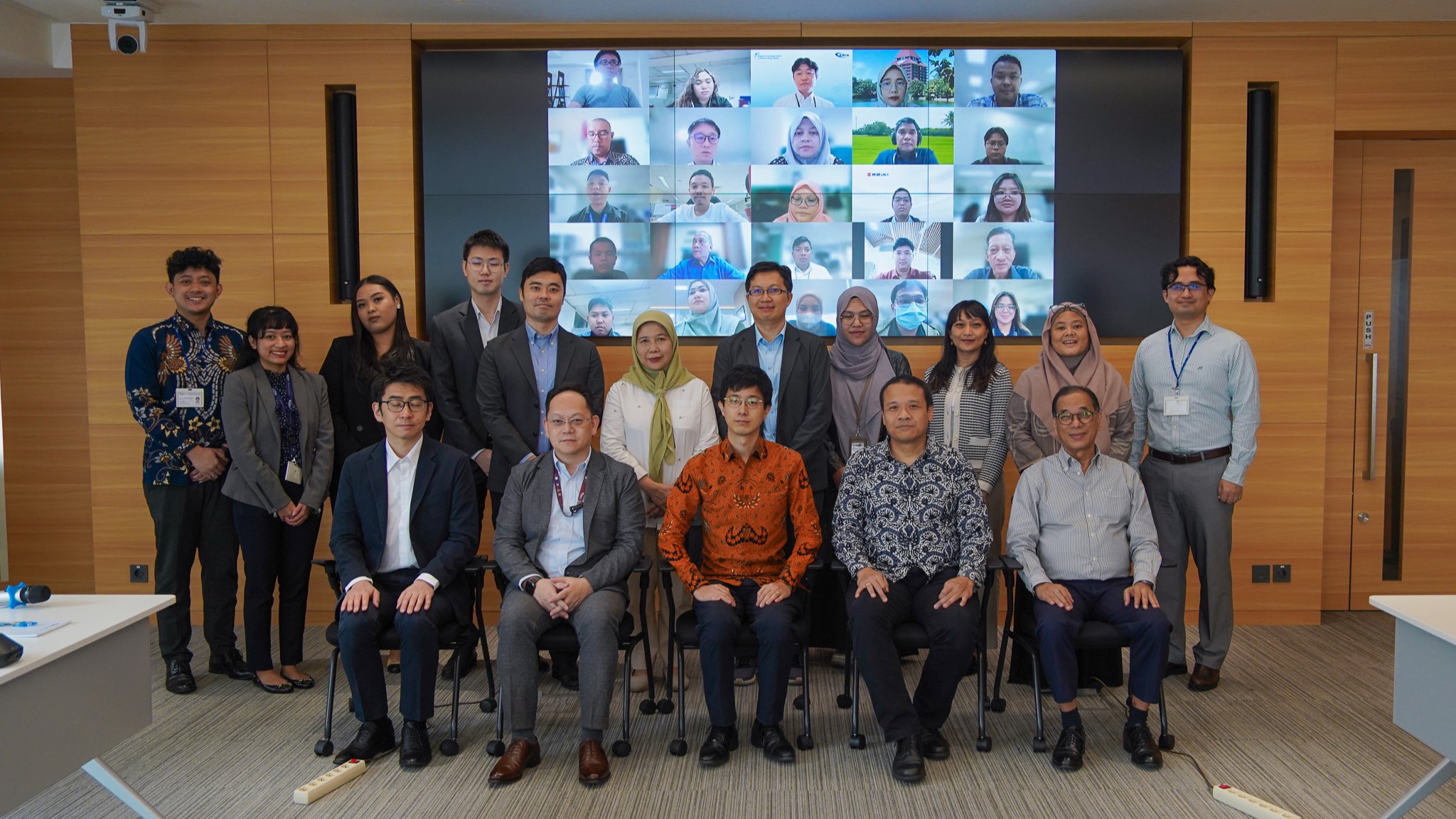ERIA and IDE-JETRO Organises International Symposium 'New Normal, Integration, and Inequality'
Date:
7 March 2017Category:
News, Press ReleasesTopics:
ASEAN, East Asia Summit, Economic Integration, Symposium, WorkshopShare Article:
Print Article:
Jakarta, Indonesia - 7 March 2017: The Economic Research Institute for ASEAN and East Asia (ERIA) and the Institute of Developing Economies - Japan External Trade Organization (IDE-JETRO) held a one day workshop followed by a half day public symposium which discussed research on integration and inequality across ASEAN and East Asia.
President Donald Trump's 'America First' policy, with its withdrawal of the US from the TPP, desire for renegotiating NAFTA, and call for imposing border taxes, signals a decisive shift away from the policies of his predecessor. Taken together with the UK's intention to leave the European Union, old certainties based around open and liberal regional trading regimes no longer seem to have resonance, causing uncertainty about what the 'new normal' is.
Given this global context, leaders of East Asian and ASEAN nations must prioritise completing the Regional Comprehensive Economic Partnership (RCEP) negotiation by the end of 2017. It is very important for the region in order to maintain growth momentum.
Prof Mari Elka Pangestu from the University of Indonesia, who served as Indonesia's Minister of Trade in 2004 to 2011 and Minister of Tourism and Creative Economy in 2011 to 2014, delivered the keynote speech in the first session of the symposium in which she stated that the share of East Asia intraregional trade increased from 45 percent in 1990 to 55 percent in 2014 thanks to a conducive and open world economy. Within that period, economic liberalisation happened; however, the world has changed dramatically in the last several years forming a 'new normal'. Prof Pangestu said that Asia could not respond by doing business as usual, especially at a time when world trade growth is slow and at, or lower than, gross domestic product (GDP) growth.
'Asian integration can be the new tailwind of the global economy,' she said, adding that 'RCEP is the only game in town.'
She stated that the drop in global trade was caused by policy uncertainty. Asia is the region that managed to grow at the fastest pace in the world, and ASEAN centrality is key to moving RCEP forward. 'RCEP is the last resort for ASEAN to gain centrality,' stated Dr Wisarn Pupphavesa, Senior Advisor for International Economic Relations at the Thailand Development Research Institute.
Dr Theresa M Greaney, an Associate Professor from the University of Hawai'i, stated in her keynote speech for the second session discussing regional integration and inequality that it was inaccurate to place the blame for inequality on trade.
'Trade economists are very united in the opinion that trade is not the sole cause for inequality. You grow a bigger pie by being open to trade. The question is how to distribute the pie. We need research and policy attention on resource distribution.'
The Economic Research Institute for ASEAN and East Asia (ERIA) is an international organisation based in Jakarta. Since its founding in 2008, ERIA, through its research, supports the regional economic integration process among ASEAN member countries. As the leading economic think tank in the region and the Sherpa institution for the East Asia and ASEAN Summit process, ERIA's research and policy recommendations have influenced the policymaking process in the region.
The Institute of Developing Economies (IDE) aims to make intellectual contributions to the world as a leading centre of social-science research on developing regions. We accumulate locally-grounded knowledge on these areas, clarify the conditions and issues they are facing, and disseminate a better understanding of these areas both domestically and abroad. These activities provide an intellectual foundation to facilitate cooperation between Japan and the international community for addressing development issues.
Quotes from Participants
- Indonesia (Prof Mari Elka Pangestu, Professor University of Indonesia): 'The tailwind for global growth comes from Asian integration; openness to regional integration has been and continues to be important. It creates opportunities through complementarity and by shaping domestic reforms and reducing policy uncertainty. We need collective leadership to accelerate the AEC and complete RCEP in order to send an important signal to the world on Asia's commitment towards global trade.' 'Optimism comes from Asian integration. We need to push regional trade agreements as the new tailwind pushing global growth forward.'
- Indonesia (Dr Yose Rizal Damuri, Head of Department of Economics, Center for Strategic and International Studies, Indonesia): 'This is the right time for ASEAN, including Indonesia, to make a statement that integration is the only way forward.' 'The benefits of integration are very abundant but not well understood. We need to communicate them better to government officials.'
- Malaysia (Tan Sri Datuk Dr Rebecca Fatima Sta Maria, Senior Policy Fellow, ERIA): 'We must strike while the iron is hot. We need to keep the growth momentum in East Asia. This is about the next fifty years - our negotiators must not look through the narrow lens of what's in it for me today.' Regarding TPP 'Don't throw away the baby with the bathwater. There were many good things in TPP which should be considered for RCEP.'
- Philippines (Dr Erlinda M. Medalla, Research Fellow, Philippine Institute for Development Studies): 'The Philippines remains open, geared towards greater regional integration. The current administration places utmost importance on ASEAN and East Asian Region manifested through higher budget allocated for ASEAN chairmanship.'
- Viet Nam (Dr Vo Tri Thanh, Advisor, Central Institute for Economic Management): 'Viet Nam businesses are optimistic about trade negotiations in general and they are waiting for a high quality RCEP agreement. Viet Nam also sees that TPP and RCEP are complementary. Even now that TPP has been shelved, Viet Nam is using TPP as a template for other FTA negotiation (Viet Nam-EU)'
- Thailand (Dr Wisarn Pupphavesa, Senior Advisor for International Economic Relations, Thailand Development Research Institute): 'The ASEAN Economic Community (AEC) and ASEAN +1 are insufficient and even disappointing. ASEAN+1s are stumbling blocks due to multiple tariff structures and limited quotas, complicated rules of origin (RoOs), new non-tariff measures (NTMs) and non-tariff barriers (NTBs), large number of exclusion of sensitive or highly sensitive products, limited market access and national treatment on services and investment, and lack of commitment on other issues such as trade facilitation, competition policy, intellectual property rights, GP, environment, and labour. RCEP is expected to overcome those problems.'
- Japan (Prof Shujiro Urata, Senior Research Advisor, ERIA): 'Japan needs external forces to address its structural problems. TPP is no longer a strong alternative, although it might not be totally dead, so we should continue to kept alive as a model for other agreements like RCEP.' 'We need to avoid growing protectionist policies.'
Related Documents
Session 1: The New Normal and East Asian Economic Integration
Session 2: Trade, Growth and Economic Inequality in the Asia-Pacific Region
Videos
Opening Remarks by Prof Hidetoshi Nishimura
Second session of the symposium with Keynote Speech from Dr Theresa Greaney
Closing Remarks by Dr Yuri Sato
First session of the symposium with Keynote Speech from Prof Mari Elka Pangestu







